Far and Wide with PT
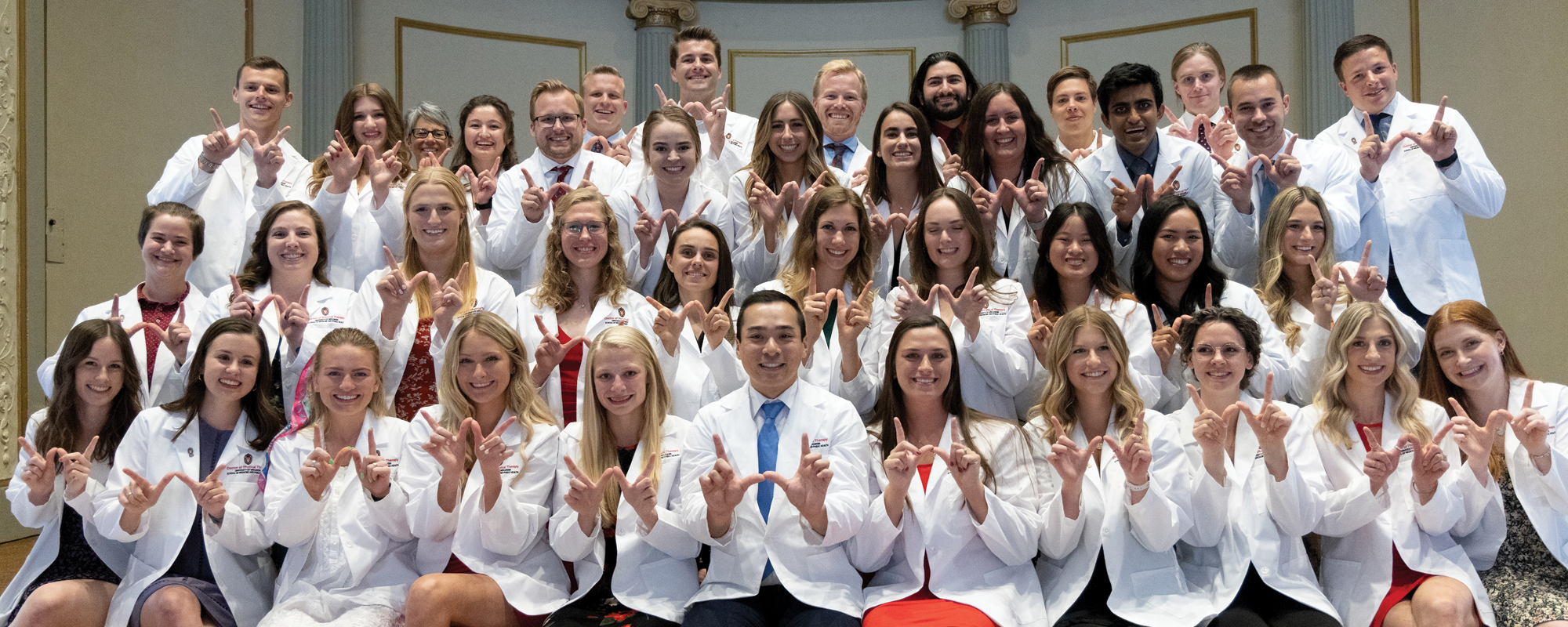
Jeff Hartman, PT, DPT, MPH ’06, says he made the best professional decision of his career when he was a physical therapist practicing in Sierra Leone in 2004. He was one of only four licensed physical therapists there immediately after a brutal, 11-year civil war. The traumatized nation was under the control of United Nations peacekeepers at the time.
“None of us were from Africa, and we estimated that there were at least 250,000 to 300,000 people who needed significant rehabilitation for every one of us who was a physical therapist,” recalls Hartman, who is now an assistant professor in the Doctor of Physical Therapy (DPT) Program at the University of Wisconsin School of Medicine and Public Health (SMPH). “I quickly realized that providing physical therapy for 10 to 20 patients per day was just a drop in the bucket, and it overwhelmed me.”
While Hartman began to seek out other community resources to help a larger number of people, he reconnected with friends who had completed doctorates in international development from UW–Madison; they helped him recognize what he was trying to do. Fortuitously, SMPH was just beginning its Master of Public Health (MPH) Program. In fall 2005, he enrolled full-time in that program while still working as a physical therapist at the Madison, Wisconsin-based UnityPoint-Health — Meriter. Hartman earned his MPH degree in 2006.
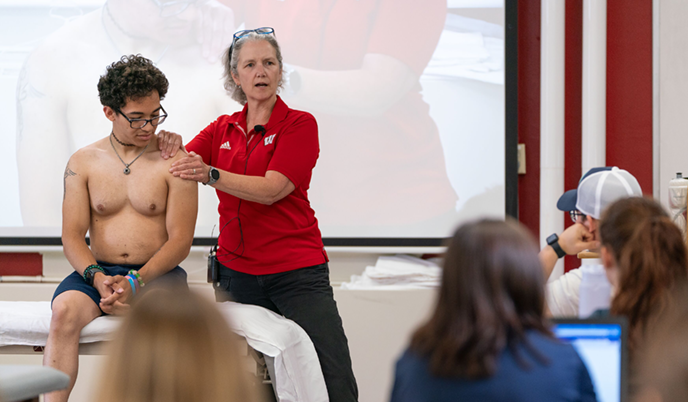
His lesson in Sierra Leone about the limits of individual patient care opened Hartman to expand his knowledge and skills in public health issues: data collection and analysis; systems thinking; and the social determinants of health. Today, he is the faculty advisor for SMPH’s latest dual-degree program: DPT/MPH.
In many ways, Hartman’s trajectory parallels that of the DPT Program itself. One of the oldest physical therapy programs in the United States, the program was founded in 1926. Three years later, it was one of the first three physical therapy curricula to receive national accreditation. The program, which initially granted physical therapy bachelor’s degrees, evolved into a master’s degree program in 1999 and a doctoral degree program in 2007.
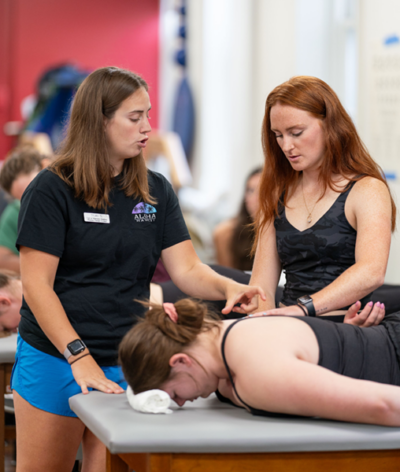
The current program includes an intense clinical-education component supplemented by service learning and ample interprofessional education. Every student must complete 42 weeks of full-time clinical education. Classroom instruction alternates with laboratory work rather than being run concurrently.
“Hands-on skills start in the students’ first semester and are built upon and advanced to specific content areas throughout the curriculum,” says Jeanne Duncan, PT, DPT ’98, director of clinical education in the DPT Program.
In the laboratories, students practice on each other and with patients who are brought in to illustrate specific disorders. The students also have access to the UW Health Clinical Simulation Program and the Wichman Clinical Teaching and Assessment Center. These hands-on experiences provide students with the ability to improve their psychomotor, professional, and clinical decision-making skills prior to entering their final internships.
DPT student Julia Schiller says her labs have included working with patients who have Parkinson’s Disease, multiple sclerosis, and scoliosis, as well as those who have had strokes. Students also work with pediatric patients of all ages, including some with prosthetic limbs. As a third-year student, Schiller is working through four required nine-week rotations in which she evaluates and treats patients. Each student must complete rotations in a hospital/acute-care setting, outpatient orthopedic clinic, and neurologic-based treatment setting. The DPT Program works with approximately 450 organizations across the country for clinical training.
While the students all receive instruction in evaluation and treatment to optimize movement, a lesson interwoven throughout the curriculum is the importance of individualizing the treatment program to the patient. This requires attention to factors outside the mechanics of movement — issues such as cultural competency, differing communication needs among different kinds of patients at various stages of life, and interprofessional collaboration.
Sue Wenker, PT, PhD ’16, an associate professor in the SMPH Department of Family Medicine and Community Health, became director of the DPT Program after Lisa Steinkamp, PT, MBA, PhD ’16, retired from that role in 2022.
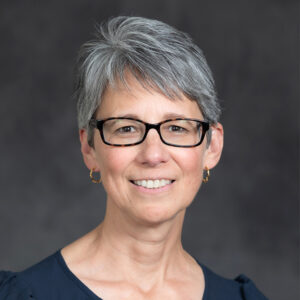
Wenker is a board-certified clinical specialist – emerita in geriatric physical therapy who also serves as the interim director of the UW Center for Interprofessional Practice and Education. She is deeply involved in developing and evaluating programs that provide opportunities for various health care professionals to work together, and she is devoted to improving care for people living with dementia.
As a young girl, Wenker spent a lot of time as her grandfather’s caretaker when he moved in with her immediate family. She explains that he likely had a form of vascular dementia, which caused him to have occasional outbursts not commensurate with the circumstances. This sparked Wenker’s continuing interest in communication strategies for people living with dementia.
“I have had patients’ wives accompany their husbands to the clinic and tell me, ‘He’s making me really angry, and I think he just wants to see how far he can push me,’” says Wenker, noting that she often is able to point out cognitive changes that may be happening.
As a trainer for the nonprofit organization Dementia Friends, Wenker helps families and caregivers learn and adopt effective communication techniques for these patients – something she also incorporates into her practice.
“Patients who have their full cognitive capacity retain information longer and follow directions,” says Wenker. “But people with cognitive impairments do not have that capacity. So, we need to better understand how to communicate with them.”
She continues, “For example, do not ask open-ended questions. Also, do not correct them for things they say if you can understand them, even if they don’t use the right words. Our interventions are often very similar to what we do for all patients, but we use a different way to help these patients complete tasks.”
As director of the DPT Program, Wenker is attuned to the broad social factors surrounding all health care professions; these include understanding and working with diverse cultures; taking a wide look beyond “the patient in front of me” to the social conditions that may have brought that patient in; and employing technology such as telehealth, artificial intelligence, and applications to extend physical-therapy care to those with barriers to access.
Service Learning
Opportunities for service-learning projects provide a way for DPT students to approach some of those broad topics. While all students are required to take part in service learning as part of their seminar courses, student involvement spans a broad array of organizations and programs. For instance, DPT service work can take place at MEDiC, a UW–Madison interprofessional, student-led network of seven clinics that serve people with limited or no insurance, and those who have other barriers to accessing care. MEDiC helps many health professions learners strengthen their skills, including how to work with fellow nursing, pharmacy, physician assistant, and medical students.
The DPT Program also offers a pro bono clinic, the Dewane Neurorehabilitation Clinic, through which its students and faculty members provide physical therapy services to uninsured patients who have movement problems due to brain or spinal cord injuries such as stroke, Parkinson’s Disease, and spina bifida. More than 80 percent of first- and second-year DPT students volunteer at the clinic. Its faculty advisor, Judith Dewane, PT, DSc, says the clinic has grown tremendously, perhaps in part because it is not a one-and-done, walk-in clinic. Instead, volunteers work with patients throughout a semester or longer.
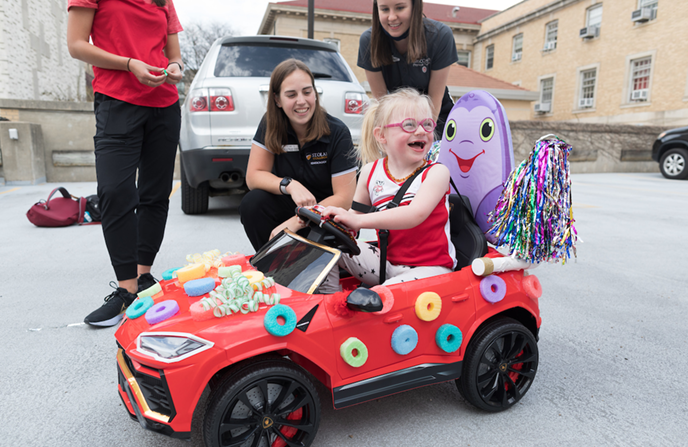
And while most service-learning projects end with more skilled and confident students, one long-standing outreach program typically ends with fun — smiling toddlers taking test drives in ride-on cars outfitted with colorful designs of baby sharks and other cartoons. Go Baby Go is a collaborative partnership among American Family Children’s Hospital, DPT and occupational therapy students, community physical therapists, and UW College of Engineering faculty and students. Working together, they build and outfit youth-size cars for children whose physical limitations make it difficult to move in their environment. In spring 2023, nine children got their own specialized car and, along with it, the ability to learn how to move on their own.
The Dual Degree
The latest major innovation in the program — the DPT/MPH dual degree — was approved in July 2019 after Amy Schubert, PT, DPT ’06, director of admissions in the DPT Program, got together with faculty and staff of the MPH Program to see how the degree programs could work together. Since 2019, three students have enrolled in the combined degree, which expands the profession’s vision to incorporate non-medical factors that powerfully shape health and wellness. It builds new skills, including systems thinking; greater understanding of biostatistics and epidemiological data; and analysis of social determinants of health. And it offers invaluable background for those whose career aspirations include global health, particularly in countries with scarce health care resources.
Graduate Accomplishments
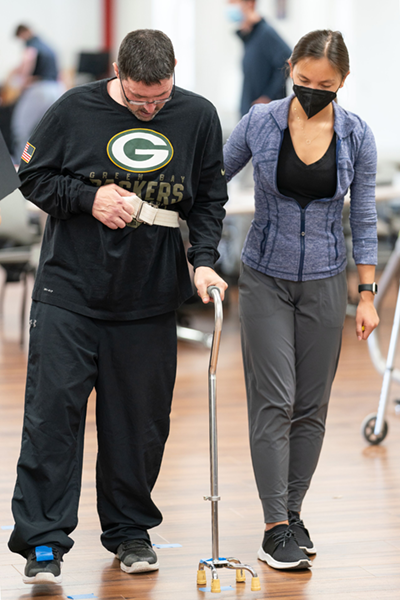
When Hartman received his MPH degree, he immediately went to work for Hillside Health Care International, which supports a clinic in Belize where UW–Madison students can participate in an internship. He says his MPH degree has been a tremendous advantage in his many global-health efforts.
“A public-health degree is almost required if you want to invest significant time in underserved areas, domestically and abroad, because the skills and perspective are incredibly valuable. These include community assessment, program planning, grant writing, and advocacy skills,” he points out. “We need to have professionals with both clinical expertise and a public-health perspective who can intervene and make changes in all aspects along ‘the river’ of health.”
The success of alumni with dual DPT/MPH degrees speaks for itself. For instance, the first graduate to earn the dual degree, Daniel Deuel, PT, DPT, MPH ’22, MEd, spent the summer after his graduation working for the Ujima Center, a community organization in Monroe, Louisiana. The center’s stated commitment to health care justice and its motto — “It takes a village; we are that village” — aptly illustrate the vision of the evolving DPT Program and the UW School of Medicine and Public Health within which it is housed.
These examples highlight what makes the DPT Program successful in providing high-quality education to help students become excellent clinicians, as well as leaders, instructors, administrators, and researchers. The program excels beyond national benchmarks related to student success passing PT certification exams and securing jobs after graduation.
“Our alumni have become world-renowned scholars and educators; leaders in political-action areas; and successful business owners who serve their communities in many ways,” reflects Wenker. “The high value of the program is hard to define, but a peek into what our alumni accomplish shares that story.”